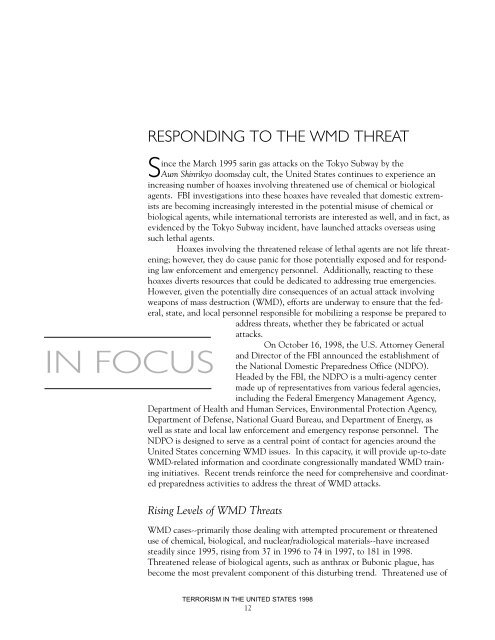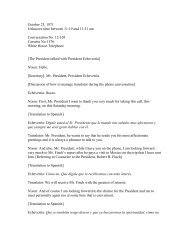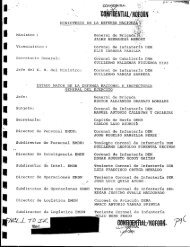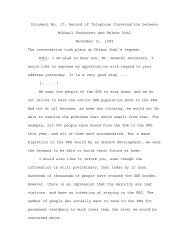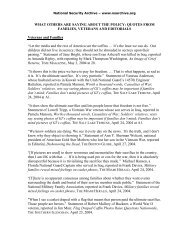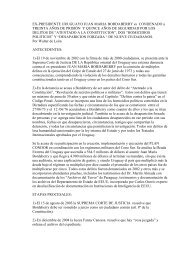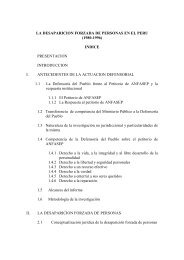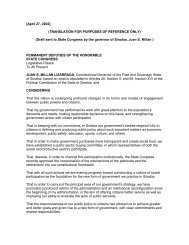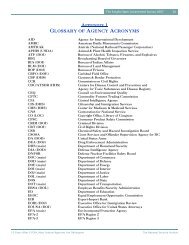TERRORISM 98 - FBI
TERRORISM 98 - FBI
TERRORISM 98 - FBI
You also want an ePaper? Increase the reach of your titles
YUMPU automatically turns print PDFs into web optimized ePapers that Google loves.
IN FOCUS<br />
RESPONDING TO THE WMD THREAT<br />
Since the March 1995 sarin gas attacks on the Tokyo Subway by the mmmn<br />
Aum Shinrikyo doomsday cult, the United States continues to experience an<br />
increasing number of hoaxes involving threatened use of chemical or biological<br />
agents. <strong>FBI</strong> investigations into these hoaxes have revealed that domestic extremists<br />
are becoming increasingly interested in the potential misuse of chemical or<br />
biological agents, while international terrorists are interested as well, and in fact, as<br />
evidenced by the Tokyo Subway incident, have launched attacks overseas using<br />
such lethal agents.<br />
Hoaxes involving the threatened release of lethal agents are not life threatening;<br />
however, they do cause panic for those potentially exposed and for responding<br />
law enforcement and emergency personnel. Additionally, reacting to these<br />
hoaxes diverts resources that could be dedicated to addressing true emergencies.<br />
However, given the potentially dire consequences of an actual attack involving<br />
weapons of mass destruction (WMD), efforts are underway to ensure that the federal,<br />
state, and local personnel responsible for mobilizing a response be prepared to<br />
address threats, whether they be fabricated or actual<br />
attacks.<br />
On October 16, 19<strong>98</strong>, the U.S. Attorney General<br />
and Director of the <strong>FBI</strong> announced the establishment of<br />
the National Domestic Preparedness Office (NDPO).<br />
Headed by the <strong>FBI</strong>, the NDPO is a multi-agency center<br />
made up of representatives from various federal agencies,<br />
including the Federal Emergency Management Agency,<br />
Department of Health and Human Services, Environmental Protection Agency,<br />
Department of Defense, National Guard Bureau, and Department of Energy, as<br />
well as state and local law enforcement and emergency response personnel. The<br />
NDPO is designed to serve as a central point of contact for agencies around the<br />
United States concerning WMD issues. In this capacity, it will provide up-to-date<br />
WMD-related information and coordinate congressionally mandated WMD training<br />
initiatives. Recent trends reinforce the need for comprehensive and coordinated<br />
preparedness activities to address the threat of WMD attacks.<br />
Rising Levels of WMD Threats<br />
WMD cases--primarily those dealing with attempted procurement or threatened<br />
use of chemical, biological, and nuclear/radiological materials--have increased<br />
steadily since 1995, rising from 37 in 1996 to 74 in 1997, to 181 in 19<strong>98</strong>.<br />
Threatened release of biological agents, such as anthrax or Bubonic plague, has<br />
become the most prevalent component of this disturbing trend. Threatened use of<br />
<strong>TERRORISM</strong> IN THE UNITED STATES 19<strong>98</strong><br />
12


